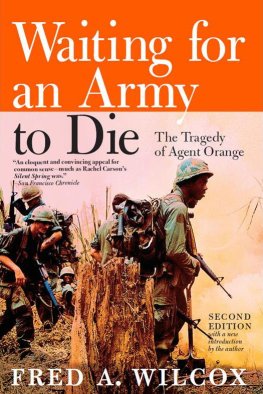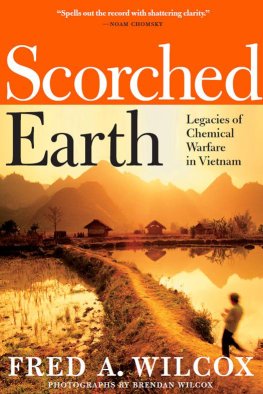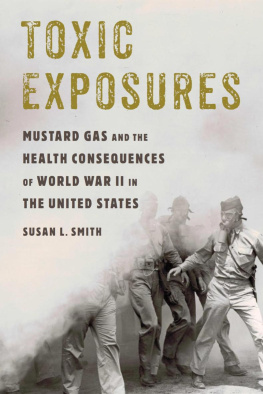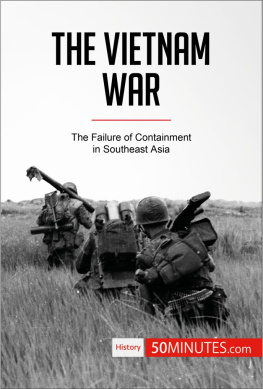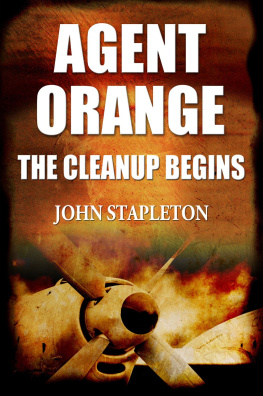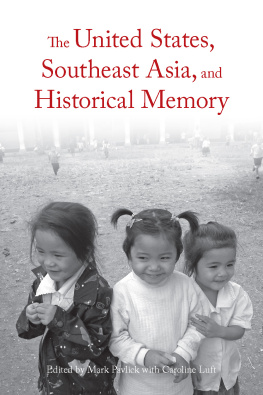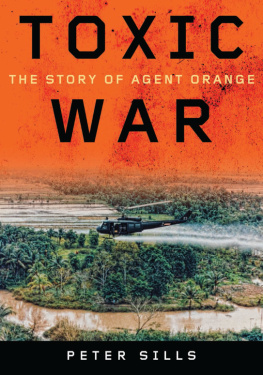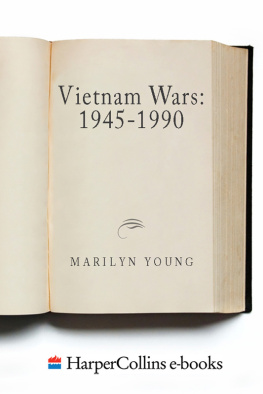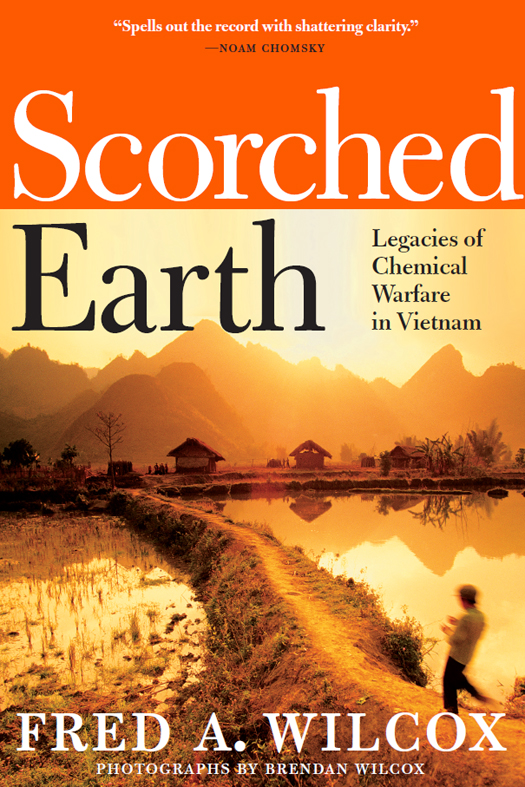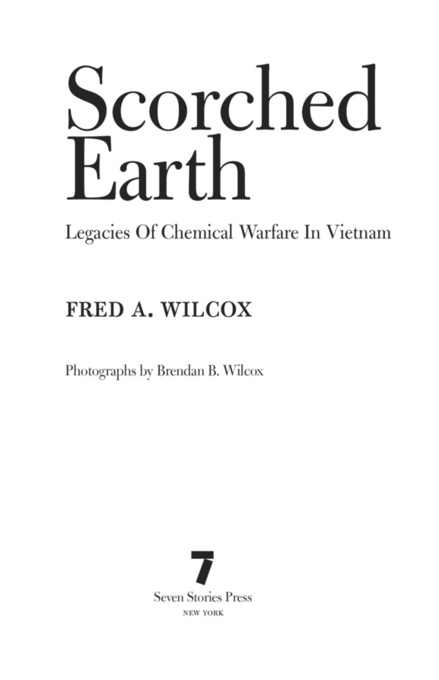Copyright 2011 by Fred A. Wilcox
A Seven Stories Press First Edition
All rights reserved. No part of this book may be reproduced, stored in a retrieval system, or transmitted in any form or by any means, including mechanical, electric, photocopying, recording, or otherwise, without the prior written permission of the publisher.
Seven Stories Press
140 Watts Street
New York, NY 10013
www.sevenstories.com
College professors may order examination copies of Seven Stories Press titles for a free six-month trial period. To order, visit http://www.sevenstories.com/textbook or send a fax on school letterhead to (212) 226-1411.
Library of Congress Cataloging-in-Publication Data
Wilcox, Fred.
Scorched earth : legacies of chemical warfare in Vietnam / Fred A. Wilcox ; photographs by Brendan B. Wilcox. A Seven Stories Press 1st ed.
p. cm.
eISBN: 978-1-60980-340-7
1. Agent OrangeHealth aspectsVietnam. 2. Agent OrangeEnvironmental aspectsVietnam. 3. Chemical warfareHealth aspectsVietnam. 4. Chemical warfareEnvironmental aspectsVietnam. 5. Vietnam War, 1961-1975Chemical warfare. I. Title.
RA 1242. T 44 W 55 2011
615.9513709597dc23
2011023208
v3.1
CONTENTS
Introduction
In the abominable history of war, with the sole exception of nuclear weapons, never has such an inhuman fate ever before been reserved for the survivors.
Dr. Ton That Tung, Vietnamese research scientist
On April 30, 1975, North Vietnamese tanks smashed into the grounds of the presidential palace in Saigon. Vietnam lay in ruins, its towns and cities bombed to rubble, the countryside seeded with unexploded mines, cluster bombs, and artillery shells. A decade of chemical warfare had reduced majestic triple canopy jungles to toxic graveyards. Mangrove forests, habitats for songbirds and vital to coastal ecosystems, had turned into eerie moonscapes.
Agent Orange, the most widely used herbicide in Vietnam, was named after the orange stripe painted around the fifty-five-gallon barrels in which it was stored. It was a fifty-fifty combination of 2,4-D and 2,4,5-T, two commercial herbicides used widely in the United States. The 2,4,5-T in Agent Orange was contaminated with TCDD-dioxin, a carcinogenic, fetus-deforming, and quite possibly mutagenic chemical. Nearly forty years after the last spray mission, scientists continue to find high levels of dioxin in the food and water near abandoned military bases and in the blood, fatty tissue, and mothers milk of the Vietnamese who live near these installations.
Making their way through dense jungles, US soldiers heard a cacophony of squawking birds, chattering monkeys, and insects buzzing like high-voltage wires. But after C-123 cargo planes swooped low over the trees, inundating them with Agent Orange, the ground was littered with decaying jungle birds and paralyzed and dying monkeys. Clusters of dead fish shimmered like buttons on the surface of slow-moving streams. It was, said one combat veteran with whom I spoke, like walking through a graveyard.
Years later, veterans would recall being soaked like the trees when aircraft jettisoned their herbicides. Theyd also remember feeling dizzy, bleeding from the nose and mouth, and suffering from debilitating skin rashes and violent headaches after being exposed to Agent Orange.
Vietnamese caught in the path of herbicide missions complained that they felt faint, bled from the nose and mouth, vomited, suffered from numbness in their hands and feet, and experienced migraine-like headaches. They said that farm animals grew weak, got sick, and even died after being exposed to defoliants. As the use of herbicides escalated, Saigon newspapers risked publishing stories about babies born with heads shaped like mice, pigs, and sheep, about two-headed babies. Peasants whose families had lived on the same land for generations said theyd never encountered such strange phenomena. Doctors and nurses who delivered these babies could not recall having seen similar birth defects before the American War.
Scorched Earth is about a tragedy that, unlike earthquakes, tsunamis, floods, and wars of limited duration, has been maiming and killing people for decades. It is about the aftermath of a chemical warfare campaign that destroyed the lives of several million Vietnamese adults and children. No one can be sure when, if ever, this calamity will end.
In 1983, Random House published Waiting for an Army to Die: The Tragedy of Agent Orange, the first book to chronicle the effects of Agent Orange on Vietnam veterans. Id spent two years interviewing scientists, doctors, lawyers, and young veterans who were sick and dying from diseases that normally do not attack young men. Many of these illnesses were remarkably similar to those from which laboratory animals suffer when they are exposed to TCDD-dioxin. Moreover, veterans from Australia, South Korea, and New Zealand whod been exposed to Agent Orange were experiencing illnessescancer, numbness in their arms and legs, diabetes, and heart problemssimilar to those from which US veterans were suffering.
For the next thirty years, I kept track of research on the effects of Agent Orange/dioxin on human beings and animals, taught college-level courses on the Vietnam War, wrote extensively about the war, and worked with veterans to persuade the government theyd served to treat them with dignity and respect, and to compensate them for the long list of illnesses theyd contracted due to their exposure to toxic chemicals in Vietnam.
I have long believed that the missing link that will prove once and for all that Agent Orange destroys human beings would be found in Vietnam. In July 2009, after many long years of preparing to research and write about this link, I flew with my son on the first leg of an arduous investigative journey. On a previous trip to Vietnam, I visited a small base camp that Vietcong soldiers had constructed deep inside of the jungle. Decades after the US Air Force sprayed the area with Agent Orange, this hideaway could easily be spotted from the air. There were no birds and no animals except crocodiles and monkeys with large lumps growing on their skinny bodies. No sign that the jungle would ever return.
My methodology in writing Scorched Earth was scientifically anecdotal, or anecdotally scientific. I did not set out to gather mountains of statistics or studies jam-packed with incomprehensible charts and graphs. Instead, I wanted to meet Vietnamese people whod been exposed to Agent Orange; I wanted to listen to their stories and to hear if their accounts were similar to those of American veterans, as well as veterans from the other nations that sent troops to fight in Southeast Asia. Additionally, I hoped to talk with Vietnamese scientists, doctors, community activists, and others whod dedicated their lives to researching the effects of Agent Orange/dioxin on human beings. In short, I set out to listen to Vietnam.
I wanted to observe what life is like for impoverished victims of chemical warfare in Vietnam and to record what ordinary Vietnamese have to say about the effects of Agent Orange/dioxin on their families, and how they view their future. In many respects, I was determined to be a kind of medium for people who, as I found, struggle to survive not only their serious illnesses, but the sorrow of knowing that their plight, their destiny, is irrevocable. Their children will never attend school; they will never be able to work, marry, or bear children of their own.


